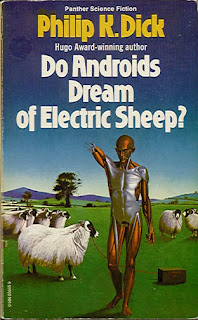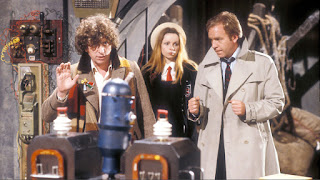You know I love me some
Doctor Who. You know that. Maybe you don't. Maybe you have no idea about me and my
Doctor Who and how I get down when the TARDIS howls. I get giddy. Panda and I both get us some giddy. We've never grown out of it. It's not going to happen.
Other things that we're prone to are opinions. That is real. So, you know we have
Doctor Who related opinions, and with the new season on it's way, I thought I might rifle through the DVDs and drop some of the aforementioned opinions on stories of Doctors past.
I'm going to roll this out in order, and everyone gets a turn. Also, there are some rules that guided the decisions, but I'm not going to tell you what they are. The general thing is that I wanted to just sort of give you all one fairly solid entry point for each Doctor.
William Hartnell in
The Dalek Invasion of Earth
They're coming to invade a planet near you!
I don't know if you've heard of these Daleks. They're bad news. And we don't want them invading Earth. That's where we live. This is a bad scene. No one is keen for this kind of thing. Except the Daleks. They're all about it. They're all like, 'It's Invasi-on like Donkey Kong!' I'm going to level with you. I couldn't decide between this one,
The Time Meddler, or
The Keys of Marinus, until I thought of that Donkey Kong bit. I mean if you throw in
The Romans,
The Daleks, The Rescue, and the first episode of
An Unearthly Child (which is the first episode of the whole thing) you've got the best ones. They are. Argh! I'm so torn. Damn it, he was good!
Patrick Troughton in
The Tomb of the Cybermen
You will never look at Glad Wrap the same way!
I sometimes say to people that the Cybermen not only terrified me as a child, but that they're my favourite classic monster, which often elicits confusion. 'Why?', they ask as they wring their funny little hands. Why do so many people have funny little hands? To which I respond, 'Have you seen
Tomb of the Cybermen'. It's basically
Doctor Who flavoured classic mummy movie, straight up. Did I use that right? The Second Doctor joins an archeological expedition on a distant planet, and things get out of hand. Like, completely out of hand. Holes are dug. People die. Cybermen are involved. It's pretty much everything you want from a Cybermen story, and to this day it is my yardstick for measuring all those Cybermen stories that've followed.
John Pertwee in
Carnival of Monsters
I love carnivals!
Not often cited as the best Pertwee serial, but I really like it. One might even say that I like it the most of his stories. And they would be right. It's plot is a very plotty sort of plot, and there are things happening, and you're watching the show, and if you're like me, you're enjoying it. It starts out as your fairly straight forward sort of 'this isn't where we meant to end up' story (which is a whole thing in
Doctor Who), but then it very quickly turns into 'there is something not entirely right going on here' (also a thing), and then you're like 'I think something here is broken'. There are some elements that you'll just sort of take in your stride, because it's
Doctor Who, but then there's the bit that is further, which is where this goes, and your stride will be interrupted as a result.
Tom Baker in
City of Death
What happens when Douglas Adams sends The Fourth Doctor and The Second Romana to Paris?
That's correct! Douglas Bloody Adams! I'm not even kidding. He wrote two, and this is the better of the two, and the plot is the kind of thing that can only be told in
Doctor Who. It's full to the brim of the timeiest of time-stuff. It's laden. It's all over the walls. It's funny. The villain is a Bond villain (it's Julian Glover), and the companion is Romana. She is my favourite. Hands down. I had a crush on her from the age of about five or six until infinite! I love this story so very, very much. Just watch it. If you've never delved far, or at all, into the original run of the show, this is something you absolutely must see.
Peter Davison in
The Caves of Androzani
Not really a lot like
Dune at all.
When I tell you that it's about the mining of drugs on a desert planet, you're going to say, 'like
Dune', and I'm going to say, 'Not really'. You see, it's pretty different to that. There are more robots. A whole army of said robots in fact. Someone once told me at a party (these things always get said at parties) that it's an analogue for a real world historical event. I mean, damn, not the robots. Clearly. But, like the general premise, but this story isn't just historical analogues, robot armies, and drug wars. Not 'The War on Drugs' drug wars, but like a war over who can have the drugs. Well, control the drugs. Everyone wants to have the drugs. Children's television in the eighties. What can I say? Actually, the modern series has had drugs and addiction, so I guess just children's television in general. There are also gunrunners. People get executed. The Doctor milks a bat. It's a good story.
Colin Baker in
Vengeance on Varos
Do you see where we're headed? Do you?
It's dark. One of the darkest ones. You might watch this, and honestly wonder how it got aired as part of the same show. It's all up in the 'This is where we're headed with the violence' brand of science fiction. It's an oddity. A lot of what was going on for the Sixth Doctor felt restrained. Not this. There were little restraints involved in this. Not little restraints, as in restraints that are small, but few restraints. It's mostly unrestrained. It's the sort of no holds barred
Doctor Who the eighties were ready to make, and then everyone freaked out. Some part of that would be the people dying in acid, but not all of it. Some of it would be the other violence.
Sylvester McCoy in
The Curse of Fenric -
Director's Cut
With 12 extra minutes!
This was not my favourite Seventh Doctor story when I first watched them on TV, but the recut version on the DVD, and I'm assuming other formats, is a substantially better experience. The narative is clearer and there are more minutes. 12 of them. I think they also redid some of the special visual shenaniganery. It's just better. Not that the original TV version is bad, or not even not good, but it's behind things like
Remembrance of the Daleks, which the recut version is not. Some people would probably say that it still is. I am not those people. I mean, it's all World War II spies, and vampires, and ancient enemies and the like. It's great, and you want the best version of that. You also want the best version of the Seventh Doctor, which is this. He's cleverer. In both versions. With or without the 12 extra minutes.
Paul McGann in
Enemy Within
The best of the only one. It's the only one.
Back when I was all of 14ish, and after 7 whole years without new episodes of
Doctor Who, they told us that there might be more, and that a pilot film had been made. It was this, and it was actually, and irritatingly, titled
Doctor Who, but the fans decided otherwise, because, are you kidding? That's the show's name! The story itself is, well, it's not really good a tall, but it's either this or
The Night of the Doctor, which is only a handful of minutes long, and you can't hold time. The Doctor maybe can, and Paul McGann is an incredible one of those. A time holder. Amazing, in fact. Unfortunately, all of his best stories are audio stories. If you're a commuter, I would highly recommend getting some of those on your iPod, or mp3 blaster.
Christopher Eccleston in
The Empty Child and
The Doctor Dances
A zombie child, an unwed teenage mother, and an intergalactic conman walk into a bar.
This was the story in the first season of the new run that made me realise that this show was not only exactly what the 21st century needed, but that it was set to be incredible. Drama, comedy, tragedy, and horror clown-car into two episodes in London during the Blitz. Then there's Captain Jack Harkness at his Captain Jackiest. Also creepy wartime hospitals, and invisible spaceships, and the threat of zombie armageddon. Fantastic!
David Tenant in
The Girl in the Fireplace
Not, like, in the fire. It's not about immolation.
This was a hard one. David Tenant had an insane run as the Tenth Doctor, and his first two seasons in particular are heavy with great stories, but I chose
The Girl in the Fireplace because it's wonderful, and it's funny, and it's creepy, and it's a little heartbreaking, and it's beautiful to look at, and it kind of does a great many of the things that
Doctor Who does so well: Spaceships, history, mystery, monsters, and 'stuff because reasons and plot, so shut-up'. I mean, there is stuff in this. Stuff they don't bother to really explain, but it's good. There's also learning to do. There are real, actual, 'once upon a time, and I'm not making this up' people in this story, and the characters talk about their culture in a real way. I mean, boxes ticked, people. So many boxes, and it's fun. Did I mention the fun?
Matt Smith in
The Doctor's Wife
Best kissing on the show ever! Ever! David Tenant gets schooled!
This was another one where there were contenders, but this is great. Really great! It's pretty tonally delicious. It's creepy, and it's funny, and, I mean, the dialogue is glorious. Actually glorious. I am more than a little bit in love with this episode, and we get to see Matt Smith Smithing all over the place. He Smiths it right up, and lead guest character is just this thing that I can't even explain. I can, but it would be ruinsome. Way better to not be ruined. You could have that. Go watch it! Do that! It's so much better than me talking about it.
Some of these guys definitely deserve more of my attention than just one episode. Not Paul McGann. That's all he has. I've covered him. The others though. They can have more.
I'll do that later.
Any disagreements?













































